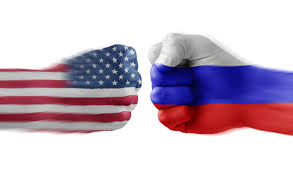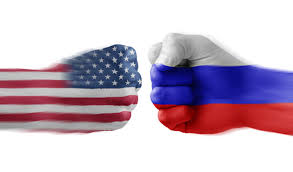
Almost a year after election of Donald Trump as the U.S. President, Moscow’s foreign policy community shows more signs of alarm than triumph, even though Russia may have got what it wished for with the election of U.S. President.
There’s deep concern that the role of an unpredictable, militarily adventurous superpower – played by Russia since 2014 – may be passing to the U.S. even while officials and others at a Kremlin-sponsored gathering of foreign and domestic Russia-watchers this week have given statements of neutrality toward the U.S. vote.
According to current and former policy makers at the annual Valdai Club conference in Sochi, let alone resetting a damaged relationship, even Russia’s ability to influence the debate in Washington has vanished. Russian diplomats have become too toxic even to talk to in Washington, said one official, speaking at a closed panel under so-called Chatham House rules with an official investigation under way into alleged Russian meddling in last year’s U.S. presidential election.
“Russia has become a meme’’ for America’s internal political debate, just at the moment when “the U.S. has become the biggest factor for uncertainty in the world,’’ said Fyodor Lukyanov, the Valdai Club’s research director and chairman of Russia’s Council on Foreign and Defense Policy. “No one can deliver such turbulence as the U.S.’’
Lukyanov said that after a brief period of optimism that followed Trump’s inauguration, that has left Russian leaders feeling confused, apprehensive and even “helpless’’. Meanwhile, Moscow’s own “willingness to play risky games is much less than before’’. An exit from active conflict is being pressed for by Russia’s generals in Syria. a limited deployment of United Nations peacekeepers to the conflict zone in Ukraine has been proposed by Russia recently.
As in World War I, were louder this year than at previous meetings and dominate the organization’s annual report, Russian warnings of a potential war between superpowers triggered by events in smaller countries. Fraying arms control treaties and the risk of conflict on the Korean peninsula loomed large.
regret that Hillary Clinton lost the 2016 election or nostalgia for Barack Obama – neither has been produced by anything. Both figures continue to be reviled among Russia’s foreign policy elite.
“We don’t think in those terms,’’ said Sergey Kislyak, until earlier this year Russia’s ambassador to the U.S. The campaign-meddling storm in Washington has him at the center. U.S. presidential candidates is not something that the Russia bets on, he said. “We aren’t naïve. We know the U.S. is like a supertanker: It takes a long time to make a U-turn.’’
However, others were less sanguine. Trump is constrained by a rigid establishment even though Trump still wants to do the right thing with Russia, believes Foreign Minister Sergei Lavrov. Looking forward to what might replace the liberal, Western-dominated global order was being looked at by one panel which celebrated the demise of it.
Referring to the former Soviet leader Leonid Brezhnev, whose long rule from 1964 to 1982 ended with economic stagnation, Kortunov said and added that President Vladimir Putin -- who has officially denied his government meddled in the U.S. election -- “has no interest in becoming a second Brezhnev’’ after 18 years as President. Reform would promote a change in foreign policy and requires reconnecting with European investment. How secure the leadership in the Kremlin feels will decide the appetite for change at the same time, according to Kortunov. And the U.S. plays a vital role there.
(Source:www.bloomberg.com)
There’s deep concern that the role of an unpredictable, militarily adventurous superpower – played by Russia since 2014 – may be passing to the U.S. even while officials and others at a Kremlin-sponsored gathering of foreign and domestic Russia-watchers this week have given statements of neutrality toward the U.S. vote.
According to current and former policy makers at the annual Valdai Club conference in Sochi, let alone resetting a damaged relationship, even Russia’s ability to influence the debate in Washington has vanished. Russian diplomats have become too toxic even to talk to in Washington, said one official, speaking at a closed panel under so-called Chatham House rules with an official investigation under way into alleged Russian meddling in last year’s U.S. presidential election.
“Russia has become a meme’’ for America’s internal political debate, just at the moment when “the U.S. has become the biggest factor for uncertainty in the world,’’ said Fyodor Lukyanov, the Valdai Club’s research director and chairman of Russia’s Council on Foreign and Defense Policy. “No one can deliver such turbulence as the U.S.’’
Lukyanov said that after a brief period of optimism that followed Trump’s inauguration, that has left Russian leaders feeling confused, apprehensive and even “helpless’’. Meanwhile, Moscow’s own “willingness to play risky games is much less than before’’. An exit from active conflict is being pressed for by Russia’s generals in Syria. a limited deployment of United Nations peacekeepers to the conflict zone in Ukraine has been proposed by Russia recently.
As in World War I, were louder this year than at previous meetings and dominate the organization’s annual report, Russian warnings of a potential war between superpowers triggered by events in smaller countries. Fraying arms control treaties and the risk of conflict on the Korean peninsula loomed large.
regret that Hillary Clinton lost the 2016 election or nostalgia for Barack Obama – neither has been produced by anything. Both figures continue to be reviled among Russia’s foreign policy elite.
“We don’t think in those terms,’’ said Sergey Kislyak, until earlier this year Russia’s ambassador to the U.S. The campaign-meddling storm in Washington has him at the center. U.S. presidential candidates is not something that the Russia bets on, he said. “We aren’t naïve. We know the U.S. is like a supertanker: It takes a long time to make a U-turn.’’
However, others were less sanguine. Trump is constrained by a rigid establishment even though Trump still wants to do the right thing with Russia, believes Foreign Minister Sergei Lavrov. Looking forward to what might replace the liberal, Western-dominated global order was being looked at by one panel which celebrated the demise of it.
Referring to the former Soviet leader Leonid Brezhnev, whose long rule from 1964 to 1982 ended with economic stagnation, Kortunov said and added that President Vladimir Putin -- who has officially denied his government meddled in the U.S. election -- “has no interest in becoming a second Brezhnev’’ after 18 years as President. Reform would promote a change in foreign policy and requires reconnecting with European investment. How secure the leadership in the Kremlin feels will decide the appetite for change at the same time, according to Kortunov. And the U.S. plays a vital role there.
(Source:www.bloomberg.com)





